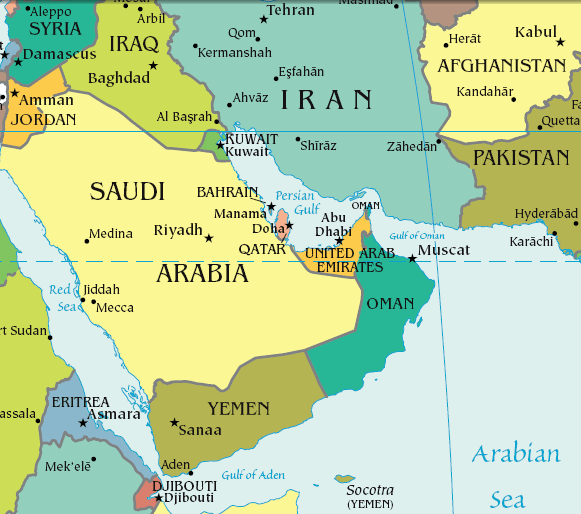On Tuesday, a bomb blast damaged four police cars just outside Manama, the capital of Bahrain. There were no casualties, according to AFP, but the attack is thought to be part of an Iran-supported series of planned terrorist attacks, targeting Bahrain’s “vital sites.”
 Persian Gulf region
Persian Gulf region
Bahrain is just a group of 33 small islands, a tiny dot on the above map, but with enormous strategic significance, for several reasons.
One reason is that the U.S. Navy’s Fifth Fleet is headquartered in Manama with responsibility for the area stretching from the Red Sea to the Indian Ocean, including the Arabian Sea and the entire Persian Gulf.
A second reason is that Bahrain’s population is roughly 2/3 Shia Muslim, and Iran has historically claimed that Bahrain is part of Iran. As recently as February 2009, an adviser to Iran’s Supreme Leader Ayatollah Seyyed Ali Khamenei stated officially that Iran had sovereignty over Bahrain, according to Al-Arabiya, although Iran had to back down in the face of vigorous protests by other Gulf Arab states.
But Iran backing down doesn’t change the fact that Bahrain’s Shia majority population are becoming increasingly angry at the government, which is controlled by the Sunni minority. Shia activists are accusing the government of discrimination in employment, housing and public services.
Starting in mid-August, the government began arresting Shia activists. It’s believed that as many as 250 people are in jail, according to Al-Jazeera, including 23 leaders of the Shia activist movement. They’ve been accused of belonging to a “terror network” seeking the government’s overthrow — a charge that carries the death penalty, according to the Washington Times.
However, parliamentary elections are scheduled for October 23, and activists are claiming that the arrests are part of a campaign to guarantee reelection for the Sunni minority. Human rights groups are accusing the government of torture, and warning that the arrests could set off sectarian violence of the kind that occurred between Sunnis and Shias in the 1990s.
The upcoming elections are also a reason why Iran would be targeting Bahran for subversive operations, according to Debka. Any weakening of the government in Bahrain would undermine American influence in the Persian Gulf, and send shock waves around the region, especially in Saudi Arabia and Kuwait which also have large Shia populations.
For millennia, Bahrain has alternated between Arab rulers and Persian rules. It became a British protectorate in the 1830s, and remained so until independence in August 1971. The King allowed parliamentary elections in 2002, for the first time in decades.
However, in a controversial move, in June 2002 the King issued a decree allowing citizens of other Gulf nations to take up dual Bahraini nationality. According to the U.S. State Dept., opposition political groups have charged that the purpose was to increase the Sunni population. Today, 10% of the population are naturalized citizens, further angering the Shia majority, who see their jobs taken away by Sunni immigrants.
From the point of view of Generational Dynamics, Bahrain is in the early stages of a growing fault line conflict between the birth-defined market-dominant Sunni minority versus the discriminated Shia majority. If Bahrain were an isolated country, then it might take years for violence to occur.
But Bahrain is not isolated. It’s one of Iran’s targets, and it’s in the heart of one of the most volatile regions on earth, guardian of the Persian Gulf, through which most of the world’s oil passes in tankers. Thus, we can expect Bahrain to become a focus of the world’s attention much sooner than that.
COMMENTS
Please let us know if you're having issues with commenting.